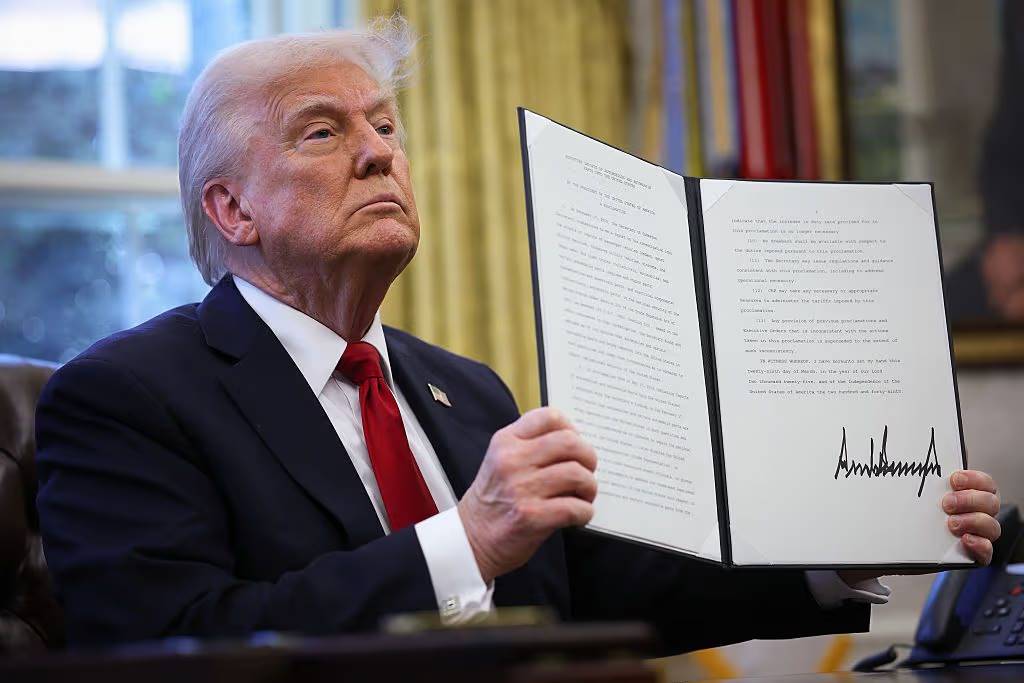Author: Benjamin Schiller
Compiled by: TechFlow
With the Trump administration announcing tariffs on Wednesday, many are pessimistic about the overall economy and cryptocurrency prices. However, analysts say there is good reason to be optimistic.

U.S. President Donald Trump signs an executive order imposing a 25 percent tariff on all foreign-made cars in the Oval Office of the White House in Washington, March 26, 2025.
Photo credit: Win McNamee/Getty Images
More information:
- Bitcoin prices have fallen significantly during the Trump administration, contrary to investor expectations.
- Economic uncertainty and tariffs have prompted investors to turn to safer assets such as gold, affecting the crypto market.
- Analysts believe that tariffs could weaken the dollar's dominance, which could be good for Bitcoin in the long run.
Crypto markets have performed very differently than expected so far during the Trump administration. Investors had hoped that regulatory changes and policies such as the Bitcoin Strategic Reserve would significantly boost prices, but the opposite has happened. Bitcoin prices peaked at well over $100,000 at the start of the year, but slumped to a low of around $85,000 for much of March.
Cryptocurrency prices have been weighed down by a stronger correlation with traditional assets such as stocks and bonds, which are suffering from macroeconomic uncertainty. Tariffs - additional fees imposed by the United States on imports from other countries - have Wall Street worried about a global recession. Crypto investors are staying away from crypto assets as they are seen as relatively risky.
“It’s all about the ‘risk appetite’ in the market, which continues to deteriorate, which has temporarily created a split between crypto assets and gold. Gold continues to be the ‘safe haven asset’ of choice,” said Marc Ostwald, chief economist and global strategist at ADM International Investor Services.
“This is largely driven by central bank reserve managers who are trying to reduce their exposure to the U.S. dollar, which has long been a concern for them.”
As the global financial and trading system becomes increasingly fragmented, investors are looking for less risky alternatives to assets, including the dollar. For now, that means turning to gold, which has risen 18% so far this year.
But that could change, according to Omid Malekan, an adjunct professor at Columbia Business School and author of "The Story of Blockchain: An Introductory Guide to the Technology No One Understands," who says Bitcoin could soon become the new gold.
“I think the whole future is uncertain and in some ways unpredictable because there are so many cross-cutting factors and both crypto and tariffs are new territory. Some people think crypto is just a risk-on tech asset that will sell off due to tariffs. But Bitcoin is seen as ‘digital gold’ in some circles and physical gold is rising rapidly on the tariff news. So which one will it be?”
In other words, economic uncertainty could prompt investors to turn to Bitcoin in the same way they have sought gold in recent months.
Another positive sign: The impact of tariffs on cryptocurrencies may already be “priced in,” and the worst may be over, said Zach Pandl, head of research at Grayscale, a leading crypto asset manager.
President Trump is expected to make his U.S. tariff announcement at 4 p.m. ET on Wednesday, April 2, also known as “Liberation Day.” He will reportedly unveil “reciprocal tariffs” against 15 countries that have imposed tariffs on the United States, including China, Canada, and Mexico.
Pandl estimates that tariffs have already slashed 2% from economic growth this year. But Liberation Day could ease the worst of the pain felt by financial markets. “If we see a tough but phased announcement on Wednesday that’s focused on the 15 countries they appear to be targeting, I would expect the market to rally on that news,” Pandl told CoinDesk.
“Once we get past this announcement, the crypto markets will likely refocus on fundamentals, which are overwhelmingly positive.”
Pandl noted that announcements like Circle’s IPO won’t happen unless institutions have confidence in the digital asset space and the policies surrounding it.
Additionally, Pandl — a former Goldman Sachs macroeconomist — believes tariffs will increase demand for non-dollar currencies.
“I think tariffs will erode the dollar’s dominance, creating space for competitors, including Bitcoin. Prices have fallen in the short term. But the first few months of the Trump administration have further strengthened my long-term belief in Bitcoin as a global monetary asset.”
Despite the current market pessimism about prices, Pandl still believes Bitcoin will hit new all-time highs this year. “I wouldn’t have quit my Wall Street job if I didn’t think Bitcoin was going to be a long-term winner,” he said.















